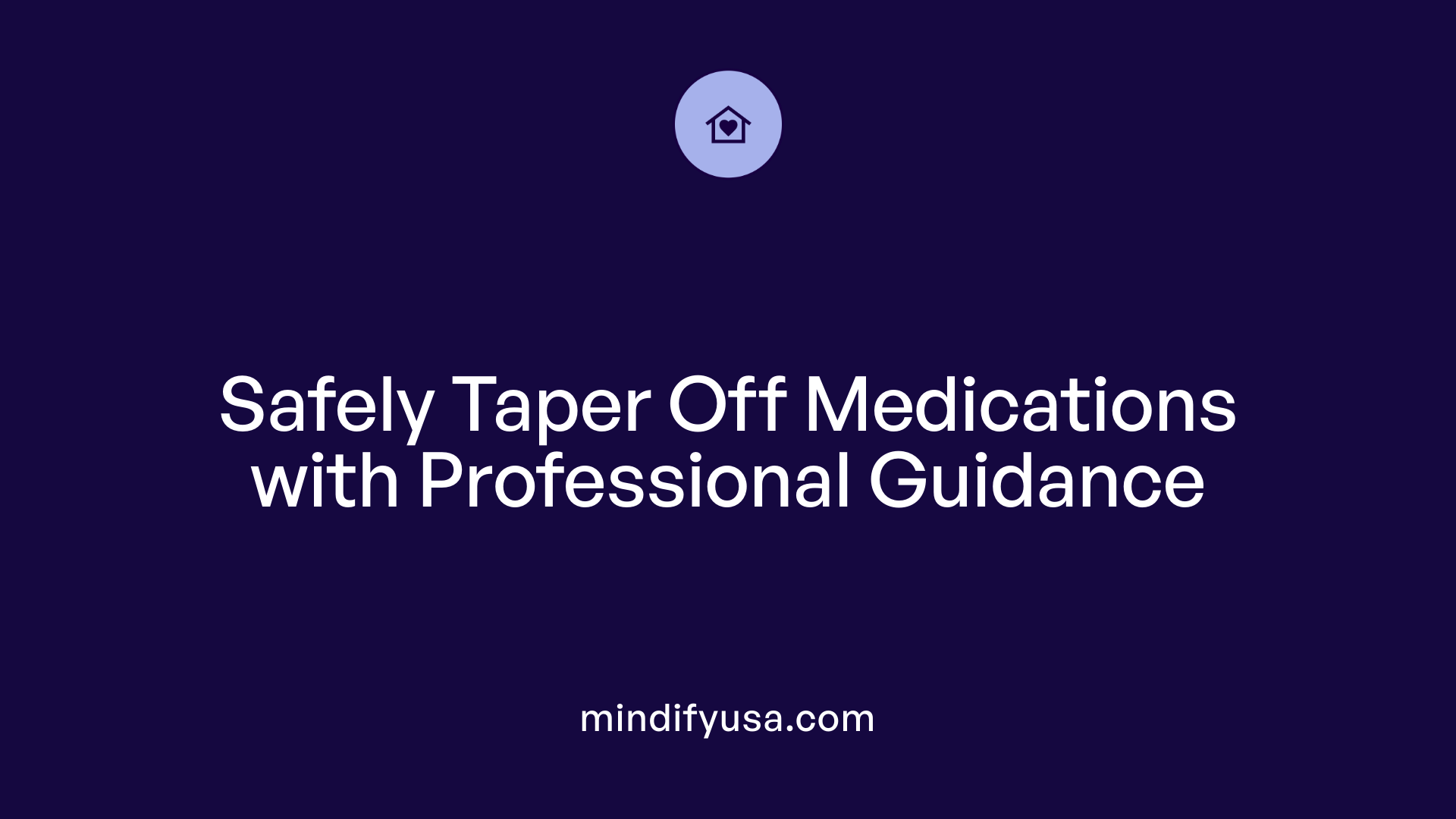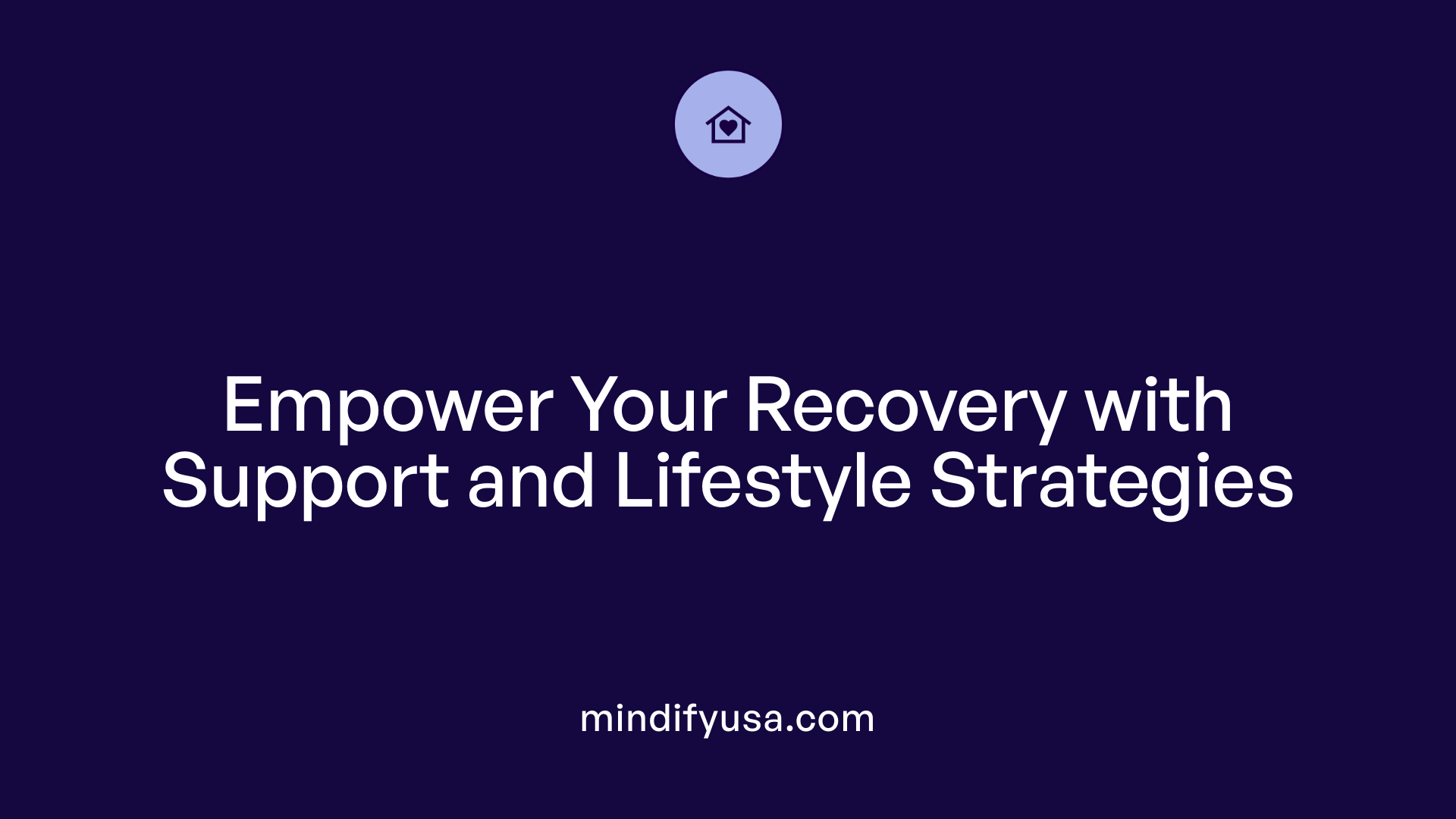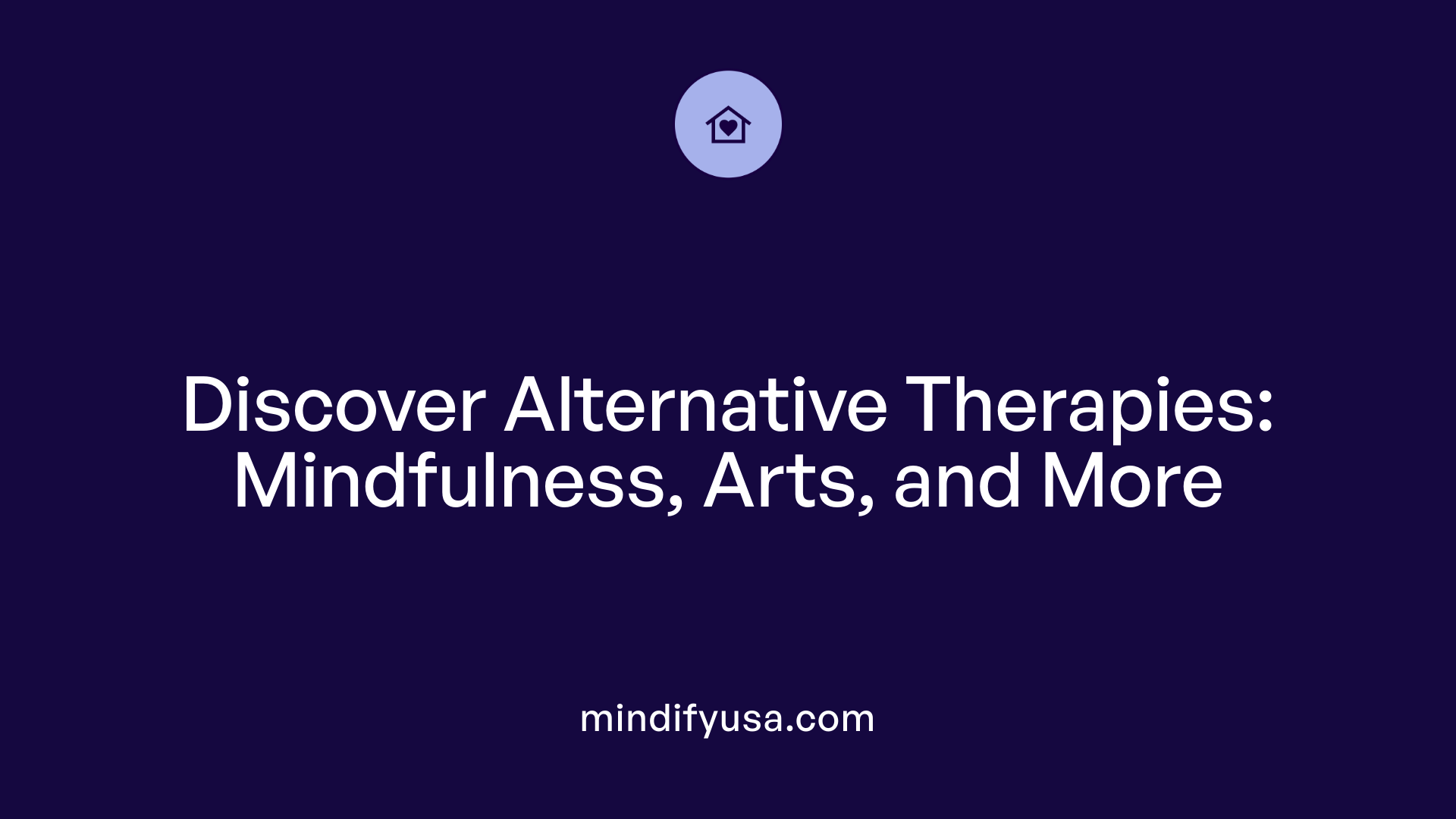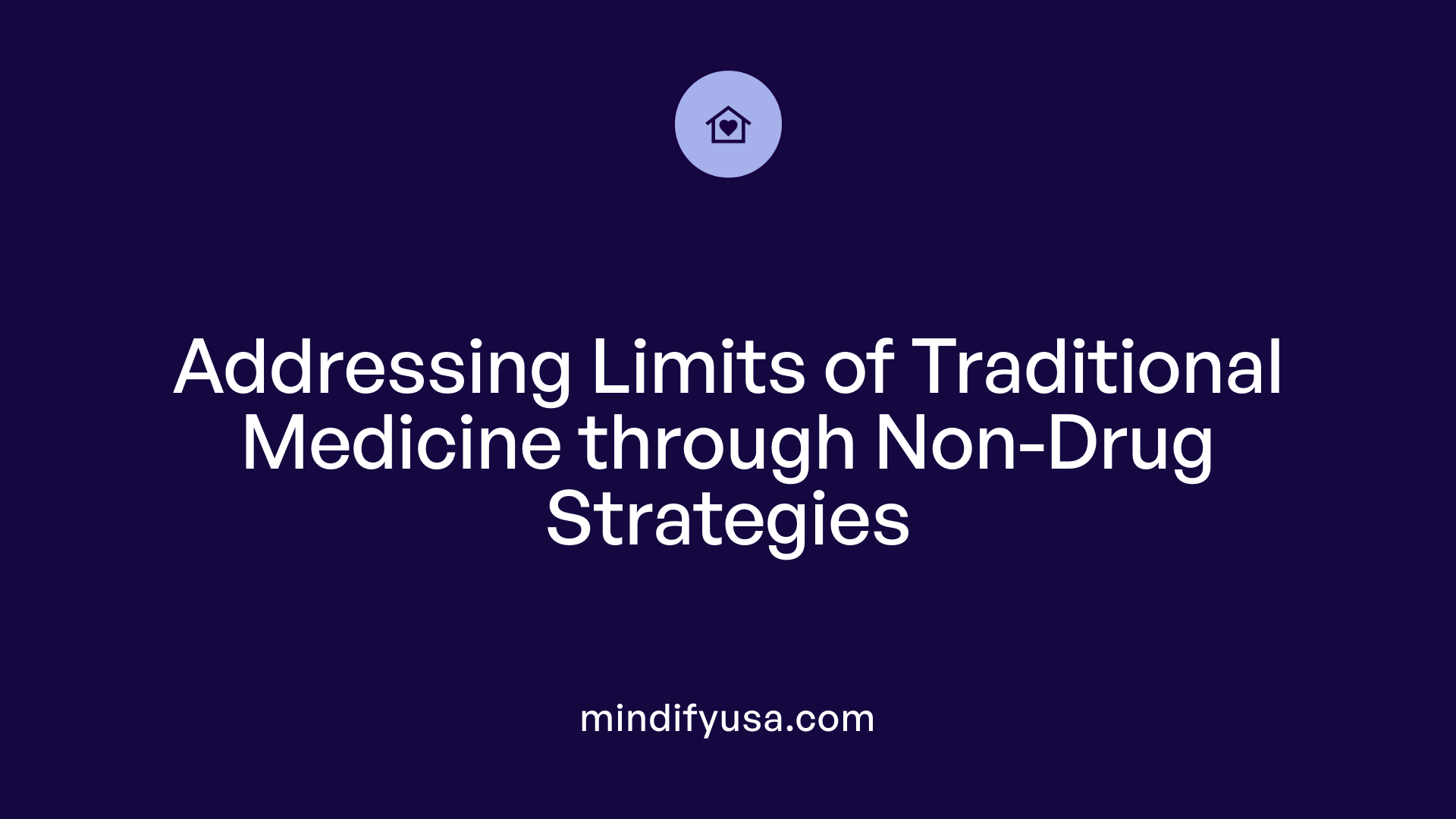Understanding the Limitations of Conventional Psychiatry and Embracing Alternative Support
Many adults are finding themselves disillusioned with traditional psychiatric medications, which often come with concerns about long-term safety, side effects, and a limited scope of treatment. This growing awareness has led to increased interest in alternative, holistic, and community-based strategies that support mental health without relying solely on medications. This article delves into a wide array of evidence-informed and experiential approaches that prioritize individual empowerment, physical health, emotional expression, and peer support, offering hope and pathways to recovery for those seeking non-medication options.
Holistic and Complementary Therapies for Mental Wellness

What are some types of alternative medicine and therapies for mental health support?
Exploring different therapeutic options beyond conventional medicine can offer additional support for mental health and emotional well-being. Many of these therapies focus on integrating the mind, body, and energy in ways that may help reduce stress, promote relaxation, and improve mood.
One popular category involves mind-body practices. These include meditation, guided imagery, hypnotherapy, biofeedback, and various relaxation techniques. Meditation and guided imagery can help quiet negative thoughts and foster emotional resilience, while biofeedback teaches awareness of physiological signals to manage stress more effectively.
Body-based practices also play a significant role. Yoga is widely known for its benefits in improving mental health through gentle stretching, mindfulness, and breathing exercises. Tai chi, a slow and flowing martial art, combines movement and meditation to enhance mental clarity and reduce anxiety. Massage therapy, chiropractic adjustments, and osteopathic manipulations focus on physical relaxation and relieving tension, which can translate into emotional relief.
Energy therapies are designed to influence external or internal energy fields. Examples include Reiki, Qigong, and therapeutic touch. These practices aim to balance or manipulate energy flow, promoting mental harmony and physical health.
Expressive arts therapies utilize creative outlets for emotional expression, healing, and connection. Art therapy involves visual arts to explore feelings, while music therapy uses sounds and rhythms to evoke emotions and facilitate coping skills. Dance and movement therapy, along with drama therapy, encourage physical expression and social interaction, helping individuals process trauma and emotional pain.
What are some popular types of alternative therapies?
| Type of Therapy | Description | Benefits |
|---|---|---|
| Mind-Body Practices | Meditation, hypnotherapy, biofeedback, relaxation techniques | Stress reduction, enhanced resilience |
| Body-Based Practices | Yoga, Tai chi, massage, chiropractic, osteopathy | Physical relaxation, reduced anxiety, improved mood |
| Energy Therapies | Reiki, Qigong, therapeutic touch | Balancing energy, emotional harmony |
| Expressive Arts Therapies | Art, music, dance, drama | Emotional expression, coping, social connection |
Important considerations
It is crucial to consult qualified practitioners and healthcare providers before starting any new therapy. While many find these approaches helpful, scientific evidence varies regarding their safety and effectiveness. Some therapies may complement traditional treatments, but they should not replace evidence-based medical or psychological care.
Individuals should be aware of their personal health circumstances and seek guidance, especially if they are using medications or managing complex mental health conditions. Proper professional supervision ensures these therapies are integrated safely into an overall wellness plan.
Additional information and resources
Searching for credible sources can enhance understanding. Use search queries like "Alternative therapies for mental health support," "holistic approaches in mental wellness," "expressive arts in mental health," and "non-medication strategies for mental wellness" to find further information.
This wide array of alternative and complementary strategies offers diverse ways to bolster mental health, promote self-awareness, and foster emotional resilience. When used alongside traditional care under professional guidance, these therapies can contribute to a balanced and holistic approach to mental well-being.
Holistic Approaches Addressing the Whole Person
What are some holistic and complementary approaches to mental health that do not involve psychiatric medications?
Holistic and complementary strategies to support mental health focus on treating the individual as a whole—body, mind, and spirit—rather than just targeting symptoms with medication. These approaches aim to promote natural resilience, emotional balance, and overall well-being.
One fundamental practice is mindfulness, which includes techniques such as meditation and breathwork. These practices help calm the mind, reduce stress, and foster greater self-awareness. Regular mindfulness exercises can improve emotional regulation and foster a sense of peace.
Arts therapies are another vital component. Engaging in art, music, dance, or drama allows individuals to express feelings that may be difficult to articulate verbally. These creative outlets can serve as emotional release mechanisms, distraction from distress, and pathways to self-discovery.
Physical activities like yoga, tai chi, and other forms of gentle exercise enhance physical health while simultaneously supporting mental health through movement and breath regulation. Yoga, in particular, has been shown through clinical research to improve mood, reduce anxiety, and support cognitive function.
Lifestyle interventions also play a crucial role. A balanced diet rich in nutrients supports brain health and gut health, which are linked to mental well-being. Community involvement and social activities combat loneliness and foster connections, vital factors in mental health resilience.
Additional therapies, such as massage, aromatherapy, acupuncture, and energy healing modalities, focus on stress reduction and energy balance. These practices can promote relaxation, ease physical discomfort, and boost mood.
Collectively, these strategies address the root causes of emotional difficulties, building resilience and fostering a state of wellness without the reliance on psychiatric medications. They emphasize self-care, awareness, and the interconnectedness of physical, emotional, and spiritual health.
Overview of Non-Medication Mental Health Approaches
| Practice Type | Examples | Benefits | Focus Area |
|---|---|---|---|
| Mindfulness and Meditation | Meditation, breathwork | Stress reduction, emotional clarity | Mind and emotional regulation |
| Arts and Creative Therapies | Art, music, dance, drama | Expression, distraction, emotional release | Emotional and expressive well-being |
| Physical Movement | Yoga, tai chi, walking | Mood enhancement, physical health | Body and mind connection |
| Lifestyle and Community | Diet, social activities, volunteering | Overall resilience, connectedness | Long-term well-being, social bonds |
| Complementary Therapies | Acupuncture, aromatherapy, massage | Relaxation, stress relief | Physical relaxation and energy balance |
References and Further Reading
- Mindfulness practices and mental health improvement: [Search query: "mindfulness mental health benefits"]
- Arts therapies and emotional expression: [Search query: "arts therapies mental health"]
- Herbal and energy therapies safety: [Search query: "complementary therapies mental health"]
- Lifestyle interventions for resilience: [Search query: "lifestyle mental health support"]
Adopting a holistic approach involves integrating these practices into daily routines and seeking guidance from qualified health professionals to tailor interventions suited to individual needs. This comprehensive perspective offers an empowering alternative or complement to traditional psychiatric treatments, emphasizing empowerment, prevention, and personal growth.
Non-Pharmaceutical Treatments for Mental Health and Addiction
What are non-pharmaceutical treatments for mental health and addiction?
Non-drug approaches to mental health and addiction involve a broad spectrum of therapies and lifestyle changes designed to improve well-being without relying solely on medications. These methods often complement or sometimes replace pharmaceutical treatments, providing individuals with more holistic options.
Psychotherapies are at the core of many non-pharmaceutical strategies. Cognitive-behavioral therapy (CBT) helps individuals identify and modify negative thought patterns and behaviors. Family therapy involves relatives in the treatment process, strengthening support networks and addressing family dynamics that influence mental health. Motivational interviewing is a client-centered approach that enhances motivation for change, especially effective in addiction recovery.
Lifestyle modifications are crucial components as well. Regular physical activity boosts brain chemistry and reduces symptoms of depression and anxiety. Eating a nutritious, balanced diet supports brain health and gut function, which are linked to emotional regulation. Maintaining good sleep hygiene ensures restorative sleep, a foundation for mental stability. Practices like mindfulness meditation help manage stress, increase emotional awareness, and promote mental clarity.
Brain-based interventions have gained attention for cases resistant to conventional therapy. Neurofeedback leverages real-time displays of brain activity to teach self-regulation. Transcranial magnetic stimulation (TMS) uses magnetic fields to stimulate specific brain areas linked to mood regulation. Electroconvulsive therapy (ECT) remains a treatment of last resort, particularly for severe depression or psychosis.
Complementary therapies, often used alongside primary treatments, include acupuncture, massage therapy, reflexology, and herbal remedies. Acupuncture may help reduce depression symptoms and pain, while massage and reflexology can alleviate stress and improve relaxation. Certain herbal supplements like St. John's wort and ginkgo biloba have been explored for mood enhancement, though their effects vary.
Combining these approaches tailored to each person’s condition and cultural context often yields the best outcomes. Importantly, consulting healthcare professionals before initiating new therapies ensures safety and appropriateness.
Below is a summary table highlighting the main non-pharmaceutical treatments and their purposes:
| Treatment Type | Main Focus to Improve Mental Health | Additional Notes |
|---|---|---|
| Psychotherapies (CBT, family therapy, motivational interviewing) | Change thought patterns and behaviors | Usually delivered by licensed therapists |
| Lifestyle modifications | Enhance overall well-being, reduce symptoms | Includes exercise, nutrition, sleep, and mindfulness |
| Brain-based interventions | Target resistant cases; neuroplasticity | Encompasses neurofeedback, TMS, and ECT |
| Complementary therapies | Support relaxation and symptom relief | Acupuncture, massage, reflexology, herbal remedies |
In essence, these interventions promote mental health through biological, psychological, and social pathways, empowering individuals to take an active role in their recovery process.
How to Safely Transition Away from Psychiatric Medications

How can someone taper off or replace psychiatric medications with alternative support strategies?
Safely reducing or discontinuing psychiatric medications is a complex process that requires careful planning and professional guidance. The first step is collaborating closely with a knowledgeable healthcare provider, such as a psychiatrist or a medical specialist experienced in medication withdrawal. Together, you can develop a personalized tapering plan tailored to your specific medications, dosages, and health history.
A gradual reduction strategy is crucial to minimize withdrawal symptoms and prevent relapse. Techniques such as hyperbolic tapering or extending the intervals between doses help create a smooth transition. It's especially important to avoid abrupt discontinuation, which can be dangerous, particularly with high-risk medications like lithium, benzodiazepines, or clozapine.
Timing the taper during periods of stability and support enhances safety. Monitoring symptoms and adjusting the plan as needed ensures a responsive approach that prioritizes your well-being.
In addition to medical supervision, integrating alternative support strategies plays a vital role. Psychotherapy, including cognitive-behavioral therapy (CBT) and other counseling approaches, can help address emotional challenges during withdrawal.
Lifestyle modifications such as regular exercise, balanced nutrition, good sleep hygiene, and mindfulness practices support brain health and resilience.
Peer support groups and holistic therapies—like arts and creative activities, massage, or meditation—offer additional emotional reinforcement and stress reduction.
It’s also important to gather comprehensive information about your medications from trusted sources and involve supportive friends or family in your journey. Their support can strengthen your resolve and provide reassurance.
Continuous monitoring for withdrawal symptoms, emotional changes, or crises, and having a plan in place for immediate assistance if needed, are essential components of a successful medication reduction process.
Ultimately, the goal is to transition gradually with the least discomfort, retaining mental stability and well-being throughout the process.
Support Systems and Recovery Strategies Without Medications

What are some support options and recovery strategies that do not rely on traditional medications?
Many individuals seeking mental health support find valuable alternatives beyond conventional psychiatric medication. Engagement in peer support groups, both local and online, is a prominent way to connect with others who understand shared experiences. These communities, such as SurvivingAntidepressants.org, offer educational resources and emotional support, empowering members to navigate medication withdrawal and mental health challenges.
Psychotherapy approaches like Cognitive Behavioral Therapy (CBT), mindfulness techniques, and motivational interviewing are well-established non-drug options. These therapies help individuals reframe negative thought patterns, develop stress management skills, and foster motivation for personal growth. Psychomotor therapy, which combines physical activity with mental health techniques, further supports emotional regulation.
Holistic therapies also contribute positively. Electroacupuncture and transcranial electrical stimulation are emerging modalities aimed at modulating brain activity to alleviate symptoms. Family skills interventions enable loved ones to provide effective support, creating a nurturing environment conducive to recovery.
Lifestyle modifications are fundamental to maintaining mental health without medication. Regular exercise, particularly activities like walking in nature, enhances mood and cellular function. Building social connections through community activities, volunteering, and maintaining healthy relationships reduces feelings of isolation and provides emotional resilience.
Supplementing these strategies with accessible resources such as mental health apps, crisis hotlines, and community programs ensures a comprehensive approach. These tools help individuals manage symptoms, access immediate support, and develop long-term coping mechanisms.
| Support and Recovery Strategies | Description | Benefits |
|---|---|---|
| Peer Support Groups | Local and online communities sharing experiences and resources | Emotional validation, shared knowledge |
| Psychotherapies (CBT, Mindfulness, MI) | Evidence-based talk therapies for emotional regulation | Skill development, symptom management |
| Holistic Therapies (Electroacupuncture, Transcranial ST) | Brain stimulation techniques to support mood | Symptom reduction, brain modulation |
| Lifestyle Supports | Exercise, social engagement, healthy habits | Improved mood, physical health |
| Resources | Apps, hotlines, community services | Immediate support, ongoing management |
These alternatives exemplify a multifaceted approach to mental health care, emphasizing personal empowerment, community involvement, and physical wellness.
By adopting these strategies, individuals can often reduce dependence on medications while fostering sustainable recovery. Healthcare providers increasingly recognize the importance of personalized, holistic treatment plans that incorporate these non-pharmacological options to enhance quality of life.
In this context, it’s crucial to involve support staff, therapists, and family members in planning and ongoing support, ensuring that interventions are tailored to individual needs, and encouraging shared decision-making. Doing so helps create a supportive environment where recovery is driven by comprehensive, non-medication-based practices.
Alternative Therapies Including Mindfulness, Arts, Psychedelic Research, and Positive Behavior Support

What alternative therapies such as mindfulness, arts, psychedelic research, and positive behavior support are used for mental health?
People seeking options beyond traditional medication often turn to a variety of alternative therapies to support their mental health. These approaches aim to reduce stress, foster emotional expression, and promote overall well-being.
Mindfulness meditation, yoga, and massage are widely used practices that help individuals manage anxiety and improve mental resilience. Mindfulness involves paying attention to the present moment non-judgmentally, which can calm racing thoughts and reduce negative emotions. Yoga combines physical postures, breathing exercises, and meditation, contributing to physical health and mental clarity. Massage therapy promotes relaxation, decreases muscle tension, and can help lower stress hormones.
In addition to physical and breathing practices, arts therapies play a significant role. Art therapy, music therapy, dance therapy, and pet therapy provide outlets for emotional expression and distraction from distressing thoughts. For example, engaging in creative art activities can help express complex feelings that might be hard to articulate otherwise. Pet therapy involves interactions with animals, which can boost mood and reduce feelings of loneliness.
Spiritual or energy healing modalities like Reiki and Qigong are also utilized, although scientific evidence varies regarding their effectiveness. Reiki involves gentle touch or no-touch techniques aimed at channeling energy to promote healing. Qigong combines meditative movement and breath control to enhance energy flow and balance.
Emerging treatment options include psychedelic research and ketamine therapy. Studies suggest that psychedelics, under professional supervision, may aid recovery from severe depression, PTSD, and suicidal thoughts. Nevertheless, these treatments are still experimental, and ongoing research is assessing their safety and efficacy.
Complementary practices like acupuncture, herbal remedies, light therapy, and nutritional supplements such as omega-3 fatty acids are also popular. While some evidence supports acupuncture’s role in reducing depression and pain, many herbal remedies have limited scientific backing and may interact with medications. For example, St. John’s Wort has been used for depression but can cause adverse interactions.
Before trying any of these therapies, it is crucial to consult healthcare professionals. Alternative treatments may serve as adjuncts, not replacements, for evidence-based therapies. Safety and proper integration into a treatment plan should always be considered, especially since the scientific support for many of these approaches varies.
In summary, the spectrum of alternative therapies offers many options for mental health support, from calming practices like mindfulness and yoga to expressive arts and emerging psychedelic treatments. While promising, individuals should seek professional guidance to ensure safe and complementary use of these therapies in their mental wellness journeys.
Limitations of Conventional Medicine and Benefits of Non-Medication Approaches

What are the limitations of conventional medicine in mental health treatment, and what are the benefits of non-medication healing approaches?
Conventional psychiatric treatments often fall short in several ways. One major concern is the safety profile of many psychotropic medications. While these drugs can be effective for some, they are associated with significant side effects, including weight gain, metabolic issues, emotional blunting, and risks of dependency or withdrawal symptoms. These adverse effects can substantially impact quality of life and adherence to treatment.
Additionally, there are notable gaps in the research supporting long-term safety and effectiveness for many psychiatric drugs. Evidence is often limited to short-term studies, and the diversity of populations studied is inadequate. This makes it difficult to fully understand how these medications perform across different age groups, ethnicities, or those with co-occurring conditions.
Another critical issue is the reductionist approach prevalent in mainstream medicine. It tends to focus primarily on neurochemical imbalances or specific symptoms, often neglecting the holistic picture of mental health. This includes biological, social, cultural, and spiritual factors that deeply influence well-being.
Access to effective treatment is also a significant hurdle. Scarcity of trained providers, high costs, and varying insurance coverage limit opportunities for many individuals seeking help. Cultural and societal stigmas further discourage treatment engagement.
In contrast, non-medication approaches offer many advantages. These methods emphasize a holistic perspective, addressing underlying factors rather than just symptoms. Community-based programs, natural therapies, mindfulness practices, and peer support foster sustainable recovery paths rooted in personal and social contexts. These interventions tend to have fewer side effects, are often more affordable, and can be tailored to individual needs.
Furthermore, integrating these approaches supports a broader understanding of mental health, encouraging patient empowerment, resilience, and self-care. By expanding the evidence base and incorporating holistic practices alongside conventional medicine, healthcare providers can better serve diverse populations, meeting complex needs in a more comprehensive and compassionate manner.
This shift toward embracing alternative and complementary strategies aligns with the growing recognition that mental health is multifaceted. It calls for a move away from solely pharmacological solutions to more inclusive, person-centered care models that promote long-term well-being and social connectedness.
| Aspect | Traditional Medicine | Non-Medication Approaches | Additional Insights |
|---|---|---|---|
| Safety | Associated with side effects and dependency risks | Generally safer with fewer adverse effects | Emphasizes overall well-being |
| Evidence Base | Limited long-term studies, gaps in research | Growing but still developing | Need for more rigorous studies |
| Holistic Focus | Tends to be reductionist | Addresses biological, social, cultural, spiritual factors | Encourages person-centered care |
| Accessibility | Often limited by cost and provider shortages | Usually more accessible and affordable | Supports community engagement |
| Sustainability | Sometimes short-term, relies on medications | Promotes sustainable lifestyle and behavioral changes | Enhances resilience |
Overall, broadening mental health care to include these non-medication strategies can help overcome many limitations inherent in traditional approaches, leading to more effective, inclusive, and sustainable outcomes.
Empowering Individuals Through a Holistic and Community-Oriented Approach
As awareness grows about the limitations of traditional psychiatric medications, more adults are exploring alternative and holistic strategies that support mental health in a more personalized, sustainable, and less invasive manner. From natural therapies and lifestyle modifications to peer support and innovative approaches like psychedelic-assisted therapy, the spectrum of options continues to expand. While scientific validation varies across therapies, many find that combining these methods with a collaborative, person-centered care model fosters resilience, improves quality of life, and redefines mental health recovery. Empowering oneself with knowledge, trustworthy resources, and supportive community networks can open new pathways to well-being beyond the confines of medication dependence, paving the way for more inclusive and effective mental health care.
References
- 10 alternative therapies for anxiety, depression, and PTSD
- Alternatives to psychiatric medication - Mind
- Top 10 Alternatives To Antidepressants | Tips for Using Alternatives
- Peer support's role in helping individuals withdraw from psychiatric ...
- Complementary and alternative treatments for mental health
- Alternatives to AA | Alternative 12 Step Programs and Recovery ...
- Alternative Treatment for Depression: Options & Remedies
- Alternatives to antidepressants - Mind






































































































